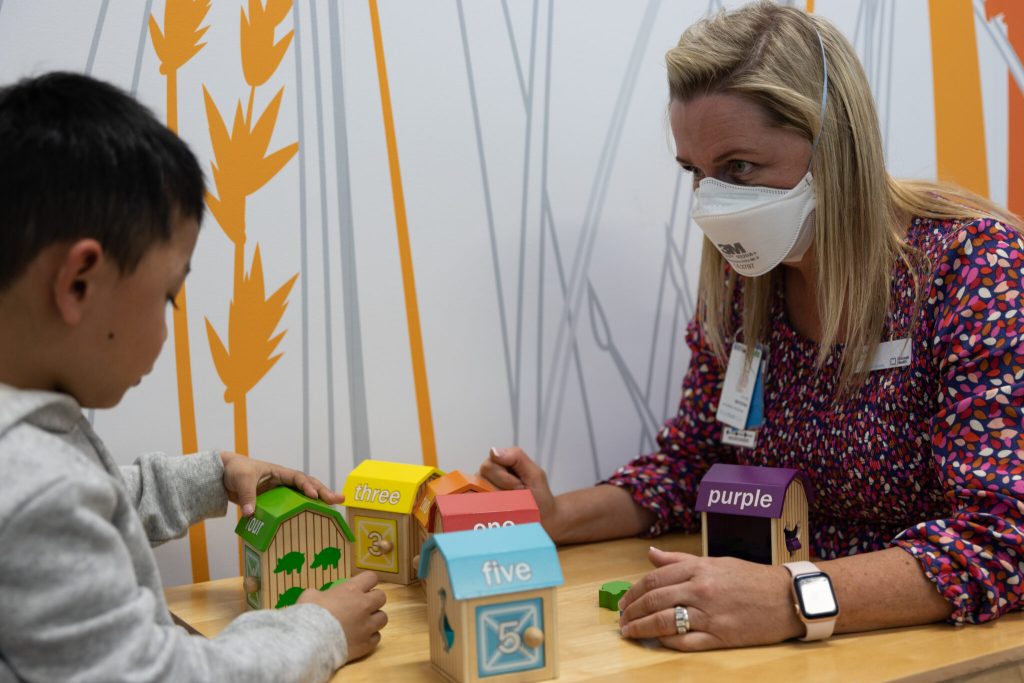
Senior psychologist Dr Alex Ure says in her 20 years of clinical experience, the Turner Neurodevelopmental Clinic at Monash Children’s Hospital represents a unique opportunity to embed research into clinical practice, enabling findings to be rapidly translated to care.
“We have the opportunity to pilot and trial different assessment and support models, and come up with tailored approaches to support families as they navigate the system. Our learnings can then be translated and implemented to improve care in clinics across Monash Health and beyond,” Dr Ure said.
Many parents of neurodiverse children sense early on that something is different and that their child might need support. “He’s scarily good at puzzles, and he has a great memory; he’ll remember something I said months ago and repeat it. But from early on his speech was delayed and he just plays in a very structured way.”
Paediatricians, teachers and other clinicians are working hard to learn more about neurodiverse conditions such as autism spectrum disorder, which affects an estimated 2-4% of the population, and Attention Deficit Hyperactivity Disorder, which affects 5-10%.
The Turner Clinic was created 18 months ago under the leadership of Professor Katrina Williams to support neurodiverse children with complex, often high needs, and their families. The clinic brings together multiple disciplines to enable a more streamlined diagnosis and the development of a tailored package of support to suit the child’s and family’s needs. It is also embedding families in research and involving them in novel programs. It is one of several clinics under the umbrella of the Turner Institute for Brain and Mental Health at Monash University, which has awarded Monash Health $450,000 over three years to establish a multidisciplinary research-active clinic.
The team of clinician researchers includes Dr Alex Ure, paediatrician Dr Kirsten Furley and speech pathologist Dr Amanda Brignell. There are also three PhD students and training opportunities for psychology interns, speech students and paediatric registrars.
Their colleague, Louise Marbina, a teacher and educational consultant from the Monash Children’s Hospital School, describes her role as the interface between health and education and works closely with patients’ schools. Louise spends time with teachers to help them understand a diagnosis and shape classroom support. Louise’s interest is in children with neurodiverse conditions and how neurodiversity affects a child’s capacity to learn and what they need to be supported in mainstream education.
The collaboration between Monash Children’s School and Developmental Paediatrics, which has been successfully trialled in several Developmental Paediatric outpatient teams, is about embracing education as part of the whole child on their healthcare journey. “Now one of the first questions asked is ‘how can education add value to what we are doing with this child in relation to their health care needs?” Louise said. “The beauty of the Turner Clinic role we have is that we can support the teachers to understand the healthcare reports they get.
“There is a real benefit in teacher speaking to teacher and helping interpret the reports they see. We can say, this is the diagnosis, but here are the practical implications in the classroom and here are some strategies and ideas that have worked before, when you are also teaching 22 others.”
The Turner Clinic has attracted support from Monash Children’s School, and additional philanthropic funds from the McNally Trust for three new programs of work:
Dr Ure is leading the development of UNIQUE, a digitised interactive visual communication prototype, tailor-made to communicate an autistic child’s individual strengths, abilities and needs in a simple and immediately accessible format to people involved in their care.
The tool also contains strategies to support the child and give staff more capacity and confidence to respond to the child’s needs, especially in preventing and managing distress.
The tool will be trialled by Monash Health patients, families and clinicians to evaluate its acceptability and effectiveness.
